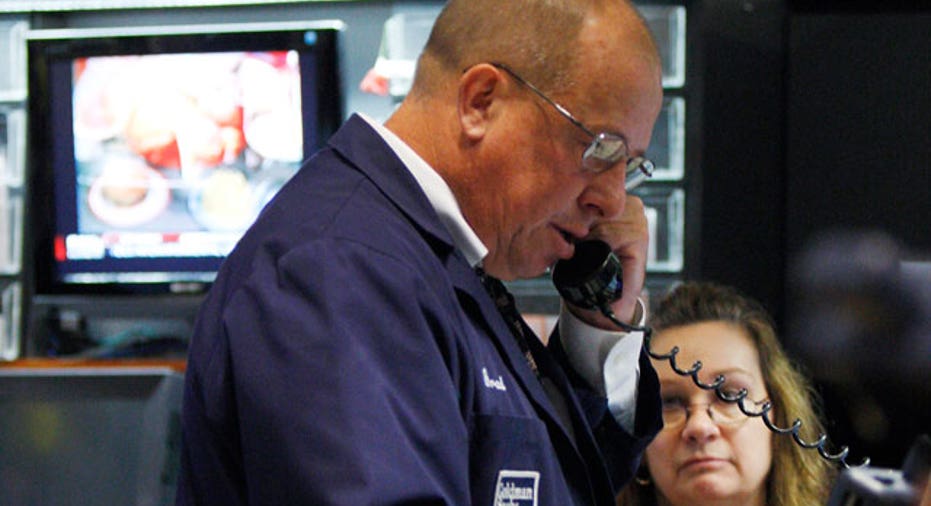Four-Day Slump? Stocks Flirt With Red

FOX Business: The Power to Prosper
After rallying early in the day, U.S. stocks had a negative bias Wednesday afternoon as bullish feelings created by a pair of economic reports largely faded amid continued concerns about the future of Greece.
Today's Markets
As of 3:03 p.m. ET, the Dow Jones Industrial Average rose 8.89 points, or 0.07%, to 12641.08, the Standard & Poor's 500 declined 1.09 points, or 0.08%, to 1329.56 and the Nasdaq Composite slumped 13.41 points, or 0.47%, to 2880.22.
With the markets well off their daily highs, they are in jeopardy of suffering a fourth-straight slump amid fears about the health of Greece's beleaguered banking system.
The markets were encouraged earlier on Wednesday by stronger-than-expected data on U.S. housing starts and factory production, as well as bullish developments for Target (NYSE:TGT) and Facebook's highly sought after initial public offering..
“Fears of a more rapid rate of contraction” in the pace of the recovery “have abated somewhat,” said Peter Kenny, managing director at Knight Capital Group. “We’re not falling off a cliff anytime soon.”
Wall Street has been mired in a slump in May, with the blue chips landing on Tuesday at their weakest level since January 19, marking their third-straight decline and ninth drop in 10 days.
"Today we’re seeing the foot off the accelerator on the sellside and a getting little bit of a lift partially from finding ourselves in the extreme oversold position in the short-term," said Kenny.
Wall Street had little response to the latest minutes from the Federal Reserve, which revealed the central bank's policy arm believes the U.S. economy remains on track for "moderate" economic growth. However, the Fed sees the so-called fiscal cliff, which refers to looming spending cuts and the end of certain tax breaks, as a "sizable risk."
U.S. stocks hit session lows and briefly dipped into the red late Wednesday morning after Reuters reported the ECB has halted momentary policy operations to some Greek banks due to the lack of a recapitalization from the government. One source told the wire service four Greek banks were operating with negative equity capital.
The ECB, which can only lend to solvent counterparties, confirmed to Dow Jones Newswires it has stopped lending to Greek banks in its conventional operations. However, Greek lenders still have access to the Bank of Greece’s more expensive Emergency Lending Assistance.
The reports come as fears about Greece exiting the eurozone have mounted due to failed efforts to form a last-ditch government. Officials said Greeks withdrew a staggering 700 million euros ($898 million) from local banks on Monday alone, raising the risk of a collapse of the banking system. That massive withdrawal figure is alarming, especially when compared with an average of 1 billion to 2 billion that had been taken out each month.
Earlier worries about debt-ridden Greece bowing out of the eurozone seemed to ebb a bit as the beaten-down euro gained on the dollar and bond yields in Italy and Spain ticked lower after spiking earlier this week.
"Our base case remains that a watered-down way for Greece to stay in the eurozone is still preferable to a disorderly exit," currency analysts at Brown Brothers Harriman wrote in a note. "Any Greek exit is unlikely to provide closure to the crisis, with Spain, Italy, and Portugal likely to come under even greater pressure."
The markets responded positively on Wednesday after the Commerce Department said U.S. housing starts rose 2.6% in April to a 717,000-unit pace, besting forecasts for 685,000 units. The government raised its March reading to a 699,000 unit pace.
The Commerce Department also said permits to build new homes declined 7% in April to a 715,000-unit pace, missing estimates for 730,000. However, permits for March were revised up to a 769,000 unit-pace, marking the strongest level since the crisis erupted in September 2008.
Housing-related stocks like Lennar (NYSE:LEN) and Lowe's (NYSE:LOW) enjoyed solid gains on the economic data.
Meanwhile, the Federal Reserve said factory production jumped 0.5% in April, the strongest increase in more than a year, while industrial output increased 1.1%.
In the commodities complex, crude oil briefly turned positive after the government released weekly inventory data that showed U.S. oil use hit a five-month high. However, crude settled at $92.81 a barrel, down $1.17, or 1.24%. Gold slumped $20.50 a troy ounce, or 1.32%, to $1,536.60.
Meanwhile, Facebook continues to see strong demand for its massive initial public offering, which is expected to price on Thursday. A day after hiking the price range for the highly-anticipated IPO, the social network bumped up its size by about 25%, meaning it could raise as much as $16 billion.
Corporate Movers
Target beat the Street with a 1% rise in first-quarter profits and upgraded its full-year guidance, sending its stock higher.
J.C. Penney (NYSE:JCP) tumbled nearly 20% a day after scrapping its dividend and revealing a 19% plunge in quarterly same-store sales. The department store operator's non-GAAP loss of 25 cents a share badly missed estimates for a loss of 10 cents.
Global Markets
The U.K.’s FTSE 100 fell 0.60% to 5405.25, France’s CAC 40 gained 0.31% to 3048.67 and Germany’s DAX slid 0.26% to 6384.26.
In Asia, Japan’s Nikkei 225 slumped 1.12% to 8801.17 and the Hong Kong Hang Seng plunged 3.19% to 19259.83.



















